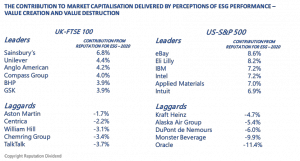
ESG ADDS UP (or DOWN)
LONDON, UNITED KINGDOM, November 30, 2020 /EINPresswire.com/ -- Appreciation of attention to ESG can add up to 10% to companies’ market capitalisation over and above any direct gains according to a latest study from Reputation Dividend.
As investors become increasingly aware of reputational risks, they consider a host of reputational factors, including ‘Corporate Social Responsibility’ and ‘Environmental, Social and Governance’ (ESG) criteria. While not the most important driver of reputation impact, perceptions of ESG prowess can provide a tangible and material boost to market cap. Equally, a perceived lack of attention can cost shareholders dear by creating drains on companies’ reputation assets.
The study finds that overall, positive perceptions of companies’ prowess in the area of ESG across the main indices in the UK and the US are boosting investor confidence to account for close to 3.1% of the gross market capitalisation, $952 billion of shareholder value in the S&P 500 and £44 billion in the FTSE 100. Within that, perceptions of especially high, or low, company performances in ESG can produce value impacts equating to up to 10% of the total market capitalisation.
Top in the UK’s FTSE for ESG contribution to market cap are Sainsbury’s, Unilever, Anglo American, Compass, BHP and GSK. Aston Martin, Centrica, William Hill, Chemring Group and Talk Talk are on the ESG value destruction side.
Top in the US’s S&P for ESG are eBay, Eli Lilly, IBM, Intel, Applied Materials and Intuit. Kraft Heinz, Alaska Air Group, Dupont de Nemours, Monster Beverage and Oracle are on the ESG value destruction side.
According to Sandra Macleod from Reputation Dividend, “Investor perceptions of companies’ ESG performance create value when seen to be strategic and driving transformation. They can also actively destroy value when seen to expose the company to undue risk. And this is where investor activism has started to muscle in. No sector, no region is safe from that fundamental questioning of value-creation or value-destruction.”
“As volatility is set to increase, we see that corporate reputations underpin or drag valuations – markets are becoming more sophisticated in their assessments and more aware of both financial and non-financial risks. Understanding the drivers and contribution of reputations in the mind of in the investment community is now more important than ever,” according to Simon Cole, the firm’s founder.
The full 2021 Reputation Dividend Report will be freely available at www.reputationdividend.com in the new year.
REPUTATION VALUE ANALYSIS – EXPLAINED
Reputation value analysis reveals the economic impact of corporate reputation in order to help companies manage the assets more effectively. It quantifies the tangible financial impact of corporate reputation by making the direct link to market capitalisation and share price performance.
Analysis is a two-stage process. First, the factors that most influence the investment community, and thus the market capitalisations, of individual companies are prioritised using statistical regression analysis of hard financial metrics, including shareholder equity, return on assets, forecast and reported dividend, earnings, liquidity and company betas and reputation measures.
From there, a combination of metrics are calculated, including the gross economic benefit shareholders derive from reputation assets, the location of value across the individual components of companies’ reputations, the extent to which investment in reputation building is likely to produce returns in value growth, and the relative value potential and risk of individual opportunities.
BACKGOUND
Founded by ex-Interbrand specialists and a team of analysts, Reputation Dividend produces the only recognised measure of the financial value of corporate reputation as a percentage of market capitalisation. The company’s annual Reputation Dividend Report spells out trends and developments in the investment community’s consumption of corporate reputation and how it impacts corporate values based on studies of more than 500 of the largest companies in the US and UK. Clients include AB-InBev, Aetna, Agilent, Airbus, Allstate, Amgen, ARM, Arrow, Bayer, Boston Scientific, eBay, GE, GKN, Hikma, Johnson & Johnson, MetLife, Phillips 66, Serco, Shire, Standard Life, Takeda, United Technologies, Zurich, Xerox.
FOR FURTHER INFORMATION:
Simon Cole
Founding Partner
simon@reputationdividend.com
+44 7956 423843
Sandra Macleod
Director
sandra@reputationdividend.com
+44 7770 328724
EIN Presswire does not exercise editorial control over third-party content provided, uploaded, published, or distributed by users of EIN Presswire. We are a distributor, not a publisher, of 3rd party content. Such content may contain the views, opinions, statements, offers, and other material of the respective users, suppliers, participants, or authors.


